Introduction:
On Tuesday, April 16th Finance Minister and Deputy Prime Minister Chrystia Freeland released the federal budget for 2024-2025, “Fairness for every generation”.
Budget 2024 is one of the most robust housing budgets in decades. While we recognize the federal government’s urgency to address the housing and economic crisis to support every generation, we must also recognize that the budget fails to consider targeted support for women fleeing violence. Yet again, women’s homelessness remains invisible.
The federal government’s budget claims to “build a Canada that works better for you… where you have a fair chance at a good middle class life”. We must ask the government, what chance at a “good middle class life” exists through this budget for those experiencing gender-based violence or human trafficking? Especially for those women, girls, and gender-diverse people who are the most marginalized?
With the 2024-25 budget being labeled as “fairness for every generation”, we question if it also upholds “fairness for every gender”. When the budget fails to address vital gendered issues such as intimate partner violence, sex trafficking, femicide, and more, we must question who truly benefits – and who is missing – from this proposed “fairness”.
Importantly, no additional funding to prevent and address gender-based violence (GBV), intimate partner violence (IPV), or human trafficking (HT) was announced in Budget 2024. The National Action Plan to End Gender-Based Violence continues to be cited in Budget 2024 only to acknowledge previous monetary investments. We have historically seen the funds set out to “address” GBV go to policing services, government services, legal or justice services, and predominantly response-focused services. To truly end GBV, we must work to prevent it. We implore the Canadian government to attribute funding intentionally towards prevention-focused initiatives.
The following marks our fourth year in a row analyzing the federal budget through the lenses of GBV eradication, equity, human rights and intersectional feminism, as always.
Housing:
Budget 2024 and Canada’s Housing Plan plans to build at least 3.87 million new homes by 2031 across communities in Canada. The budget aims to protect renters rights, and strengthen the Canadian Mortgage Charter to allow 30-year mortgage amortizations for first-time home buyers purchasing newly constructed homes.
We applaud the government for their intentions to support every generation with access to affordable housing. We also know that creating new housing units, stabilizing rent prices, and providing more opportunities for first time home buyers may address aspects of the housing crisis, but simply does not address the root causes of the issue. This is only a band-aid solution.
Housing policy is an economic policy, but it is also a gendered policy.
Last year, we called for Canada to address the housing crisis with a gendered and intersectional lens, as we know women who experience violence experience homelessness at higher rates, and women experiencing homelessness experience violence at higher rates.
Findings from our Relentless Resilience Report showed that on any given night, 6000+ women and children in Canada sleep in emergency shelters because it is not safe at “home”.
In fact, women and girls face the greatest danger in their own homes. In Canada 55% of women killed by their partners or family members were killed in their own home or the home they shared with the accused.
The question, what is the dedicated funding for women and their children experiencing or fleeing violence in their own homes?, still remains unanswered.
Violence against women and girls, and women’s homelessness has remained invisible far too long. We urge the housing policy to implement an intersectional lens to ensure that there is targeted support, preventative measures, and safety resources available for women, as well as Black, Indigenous, disabled, newcomer, and gender diverse people – as we know that they experience higher rates of homelessness and violence than anyone else.
From housing to economy, violence against women is impacting families, communities, and entire countries. So, when we work to end violence against women, we are actually investing to see our communities – and country– thrive.
Cost of Living:
Budget 2024 recognizes the global rise in the cost of living – and aims to address this through efforts towards “lowering everyday costs” by targeting grocery prices, internet and phone plans, airline fees, and even concert and sport tickets.
We must ask what the government is doing to address the fact that for countless women and children, the “cost of living” is living with their abuser. Evidence shows that women may stay in violent relationships to avoid poverty for themselves and their children. Further, women who do leave a partner to raise children on their own are 5x more likely to be poorer than if they had stayed. We know that this economic pressure for women to remain in their “homes”, where they are experiencing violence, leads to intimate partner femicides occurring weekly in Canada. The cost of living crisis in Canada in turn results in the deaths of women.
The cost of living is our lives.
When we talk about saving Canadians money – we must consider the billions it costs Canadians (disproportionately women, girls, and gender-diverse people) who experience violence. We must address the $7.4 Billion it costs Canadians annually to contend with the aftermath of spousal violence alone, and the $3.4 Billion it costs Canadian women who experience sexual assault.
Further, we call on the government to address the ongoing gender pay gap, as we know this cost of living crisis disproportionately affects women and girls, and further affects those with intersecting identities: Black women, Indigenous women, women with disabilities, 2SLGBTQIA+ folks, migrant and refugee women, and more.
From Statistics Canada, we know that the gender pay gap is “one of the root causes of gendered poverty. Women are more vulnerable to low income than men in Canada due to the gender pay gap”. Importantly, the UN’s Human Rights Committee has raised concerns about the “persisting inequalities between women and men” in Canada – specifically citing the “high level of the pay gap”. If Budget 2024 wants to bring “fairness to every generation”, specifically targeting “younger Canadians”, then we ask, why do girls aged 12-18 experience a summer job gender pay gap of almost $3.00/hour?
While we applaud Canada’s dedicated efforts to create possibilities for younger Canadians to attain a “good middle class life”, we urge Canada to create equitable possibilities – ones that address the intersecting barriers faced by women and girls to live financially stable, safe lives. When the growing cost of living crisis results in more women continuing to live with their abuser, the very person most likely to commit their femicide, women’s lives depend on it.
Gender Equity and Violence Against Women:
In 2024-2025, WAGE has stated they will focus on four key priorities: promoting and advancing women and gender equality; promoting and advancing 2SLGBTQI+ equality; preventing and addressing GBV; and leading and advancing Gender-based Analysis Plus implementation throughout the Government of Canada. While we are hopeful for these priorities to be implemented, we are disappointed to see that these priorities – particularly around preventing and addressing GBV – are not shared in Budget 2024 itself.
Budget 2024 has once again kept the Statement on Gender, Diversity, and Inclusion separate from the budget. We reaffirm that gender, diversity, and inclusion must be ingrained in every initiative, every funding pot, and every aspect of the federal budget and be done with intentional, actionable, and clear implementations – not simply ongoingly vague, monetary commitments.
We know that gender equity will never exist until women, girls, and gender-diverse people live free from violence. We also know that this violence is an epidemic – perhaps the oldest epidemic to exist. This is why Aura Freedom, alongside Women’s Habitat of Etobicoke led in the Urgent Call to Action to have Toronto declare IPV an epidemic last year, and continue to advocate for the same declaration to be made in Ontario today. We have said time and time again, we need a strong commitment to end the ongoing and escalating epidemic of GBV in Canada.
Instead, throughout Budget 2024’s 430 pages, we see the issue of GBV mentioned JUST ONCE – and only in the context of acknowledging the National Action Plan to End GBV as a “key ongoing action”. We continue to implore the federal government to follow through on the National Action Plan (which was introduced in 2021), as well as provide supplemental gender-equality funding, share additional details on the NAP, and do so with a clear plan. We continue to ask ourselves why there is no sense of urgency for the safety and rights of women in Canada when we know that HALF of the 19 million women and girls in Canada will have experienced at least one incident of physical or sexual violence since the age of 16. And when we know that a woman or girl in Canada is KILLED every 2.5 days, most often by the men closest to them.
How can our cities and provinces be encouraged to declare GBV and IPV an epidemic if our country continues to make it invisible in the federal budget?
Indigenous Economic Reconciliation and Housing:
As expected, Budget 2024 largely focused on addressing the economic and housing crisis as seen across Indigenous communities. Some of the noteworthy investments are the following,
- $350 million, over five years, starting in 2024-25, to renew Canada’s commitment to Indigenous Financial Institutions;
- $2.5 million in 2024-25, to continue supporting the Indigenous tourism industry through the Indigenous Tourism Association of Canada;
- $36 million, over three years, starting in 2024-25, to renew support for the Strategic Partnerships Initiatives’ Clean Energy program to promote Indigenous participation in clean growth opportunities; and
- $918 million over five years, starting in 2024-25 proposed to accelerate work in narrowing First Nations, Inuit, and Métis housing and infrastructure gaps.
While these may appear to be progressive investments that propose efforts for Indigenous economic reconciliation and housing affordability, it does not consider an intersectional gendered lens.
We know that far too often, Indigenous women fall through the cracks in large part due to the ongoing impacts of colonization and the persisting intergenerational trauma experienced by Indigenous communities.
Affordable housing is a human right.
Yet, on their own historic lands, Indigenous Peoples have to remain on 10 to 15-year long waitlists, or simply don’t have access to safe spaces to call home.
We will continue to monitor the investments and hold those that have committed to achieving these goals accountable.
In 2022, three First Nations women went missing in Winnipeg, and the remains of two are still undiscovered to this day. We applaud the federal government’s announcement of $20 million in 2024-25 to support efforts (in partnership with the Government of Manitoba, Indigenous partners, and impacted families) to search the Prairie Green Landfill for the remains of missing and murdered Indigenous women.
We recognize that in 2021, $2.2 billion was announced over five years to respond to MMIWG2S, yet there has been no new investment programs proposed to prevent violence and empower Indigenous survivors.
We need to stop pulling people out of the river, and implement an upstream, intersectional approach to end the violence and trafficking of Indigenous women and girls.
With one year remaining from the 2021 announcement, we urge Canada to consider implementing preventative strategies and funding opportunities that address the root cause which keeps Indigenous communities in intergenerational cycles of violence and hardship.
Human Trafficking (HT):
We are disheartened to have to repeat this statement for yet another year. Canada’s federal budget continues to overlook human trafficking (HT) and sexual exploitation. In Budget 2024, HT is referred to only once under the “Protecting Canadians from Financial Crimes” category. Further, the only efforts listed in Budget 2024 are Canada’s efforts towards establishing public-private partnerships with the financial sector. But where are the GBV sector, the women’s sector, and the HT sector – the grassroots advocates, survivors, and experts – in these national “efforts” to address HT?
We know HT is more than a crime – and a financial one, at that – it is a human rights abuse. At Aura Freedom, we recognize that HT takes place across many industries including the sex industry, domestic labour, the care sector, the service industry, farming industry, fishing industry, and more. Forced/child marriage and forced crime are other forms affecting Canadians today. Yet, the budget dedicates merely a sentence to address the complex issue.
In 2019, a five-year National Strategy To Combat Human Trafficking (National Strategy) was launched to strengthen Canada’s response to HT, including commitments to prevent and address GBV, and support the safety and security of Indigenous peoples. It was surprising to see that the budget did not indicate any commitment to renew the National Strategy.
We know GBV and HT is preventable, and we implore the federal government to make permanent funding investments as it will require years of intentional planning towards addressing the root causes, including sexism, colonialism, gender inequity, racism, homo/transphobia, ableism, and more. We know HT is not simply a financial crime, but a GBV issue, a gender issue, and a human rights issue. We implore the Canadian government to treat it as such in future budgets.
Online Exploitation:
Budget 2024 proposes to provide $52 million over five years, starting in 2024-25, with $2.1 million in remaining amortization, to Canadian Heritage and the Royal Canadian Mounted Police (RCMP) to protect children, and all Canadians, from harmful online content, as well as, provide $2.5 million in 2024-25 to Public Safety Canada to support the important work of the Canadian Centre for Child Protection in preventing and responding to online child sexual exploitation.
Certainly, with so many people using the internet for school, work, socializing and entertainment, there is also an increased risk of online exploitation. Often, traffickers use digital platforms to target, recruit, groom and exploit at-risk youth.
In a survey conducted by Aura Freedom with over 2000 youth in Toronto, 38% said they feel unsafe online and 73% said they have had online interactions with someone they didn’t know, showing a significant gap in internet safety awareness.
While we applaud Canada’s investment efforts to create safe places online for children and youth that enable participation, connection, and a sense of community, it is striking that the funding has been predominantly allocated to Canadian Heritage and the RCMP to address online child sexual exploitation. Once again, we urge the federal government to listen to grassroots organizations and survivors: focus efforts in communities, focus efforts on prevention, and allocate additional funds to address the complex human rights abuse of trafficking and sexual exploitation that occurs across Canada everyday, both online and offline.
Child Care:
We recognize the hardships that the younger generations are facing, and the efforts that Budget 2024 is taking to address this. We also recognize how closely this ties in with GBV. Each year in Canada, roughly 362,000 children witness domestic violence. These children have double the rate of psychiatric disorders as children than those from non-violent homes. Additionally, we know that 9/10 women killed in Canada had at least 1 child. And when we discuss ‘living victims of femicide’, we know there are at least 868 children in Canada who are left without their mothers due to femicide.
Budget 2024 highlighted the new Youth Mental Health Fund that will allocate $500 million over five years, starting in 2024-25, which will help younger Canadians access the mental health care they need.
This is huge. We celebrate this investment and support it whole-heartedly.
We also implore the government to continue to work towards equitable, accessible, comprehensive and appropriate mental health supports for all Canadians. Further, we implore the government to ensure these efforts acknowledge the root causes of trauma, mental illness, and addiction for youth. With the new Youth Mental Health Fund, we hope that it creates intentional opportunities to equitably support children and youth who experienced or witnessed violence, as well as, work towards prevention efforts.
In addition, Budget 2024 established “The Child Care Expansion Loan Program”, which will offer $1 billion in low-cost loans and $60 million in non-repayable contributions to public and not-for-profit child care providers to build more child care spaces and renovate their existing child care centres. This investment is also celebratory as it creates opportunities for women and caregivers to easily access more child care spaces, resulting in them participating more fully in the workforce, leading to increased economic independence and empowerment. At the same time, we also acknowledge that these supports are predominantly loans. We know that without adequate childcare options, many women may be forced to choose between professional advancement and childcare responsibilities. Investing in childcare is investing in women as it directly contributes to a more equitable society.
Canada and the World:
We recognize that the global violent conflicts, including genocide, civil and internal violence, and war, occuring today are disproportionately impacting the lives of countless women and children around the world.
We recognize Canada’s responsibility to take action towards protecting human rights and safety on a global level, and Canada’s announcement of $350 million over two years in additional humanitarian aid is an important first step. We stand with other feminist organizations in our hope that the government will utilize their global influence, such as through hosting the Group of Seven countries next year, to work collaboratively with other economic powers in order to respond to the “large-scale and deteriorating humanitarian crises around the world”, as recognized by Budget 2024.
Conclusion:
Although we have applauded the federal government’s investments to address GBV in previous years, including efforts to implement the NAP at local levels, we know that GBV is not going away tomorrow. We also know that the sector addressing this violence has been hanging by a thread for decades and needs long-term commitments and the unwavering support of its government to continue doing the life-saving work it has done for so long. Indeed, a thriving feminist sector is the key to a thriving country.
Violence against women and children is a Public Health issue and a Public Safety issue, and efforts to both prevent and address it must be embedded in each and every federal budget.
When we look at some of the biggest issues of our time – housing, healthcare, food security, addiction, mental health, workforce participation – we can draw a straight line to GBV and its impacts on those very issues. Those of us at the grassroots level know that GBV is a national emergency, yet it has never been treated as such. In Canada, IPV, femicide and sexual exploitation continue at alarming rates. Yet, the government continues to fund reactionary approaches and band-aid solutions that intervene when the violence has already happened. What is needed is a preventative approach that focuses on education, equity and decolonization which will eradicate GBV from the root. This takes long-term, robust funding that will need to appear in the Budget – every single year.
While we recognize the dedicated efforts in Budget 2024 towards developing housing policies for future generations, we also recognize that the demand for housing is inherently tied with our demands to address GBV. True gender equity leads to housing equity.
The positive impacts of ending GBV will not only be seen in our people (which should be enough to take action), but there are also profound, intergenerational fiscal benefits to ensuring the safety and well-being of women and all those they carry on their backs.
Violence against women can no longer be an afterthought.



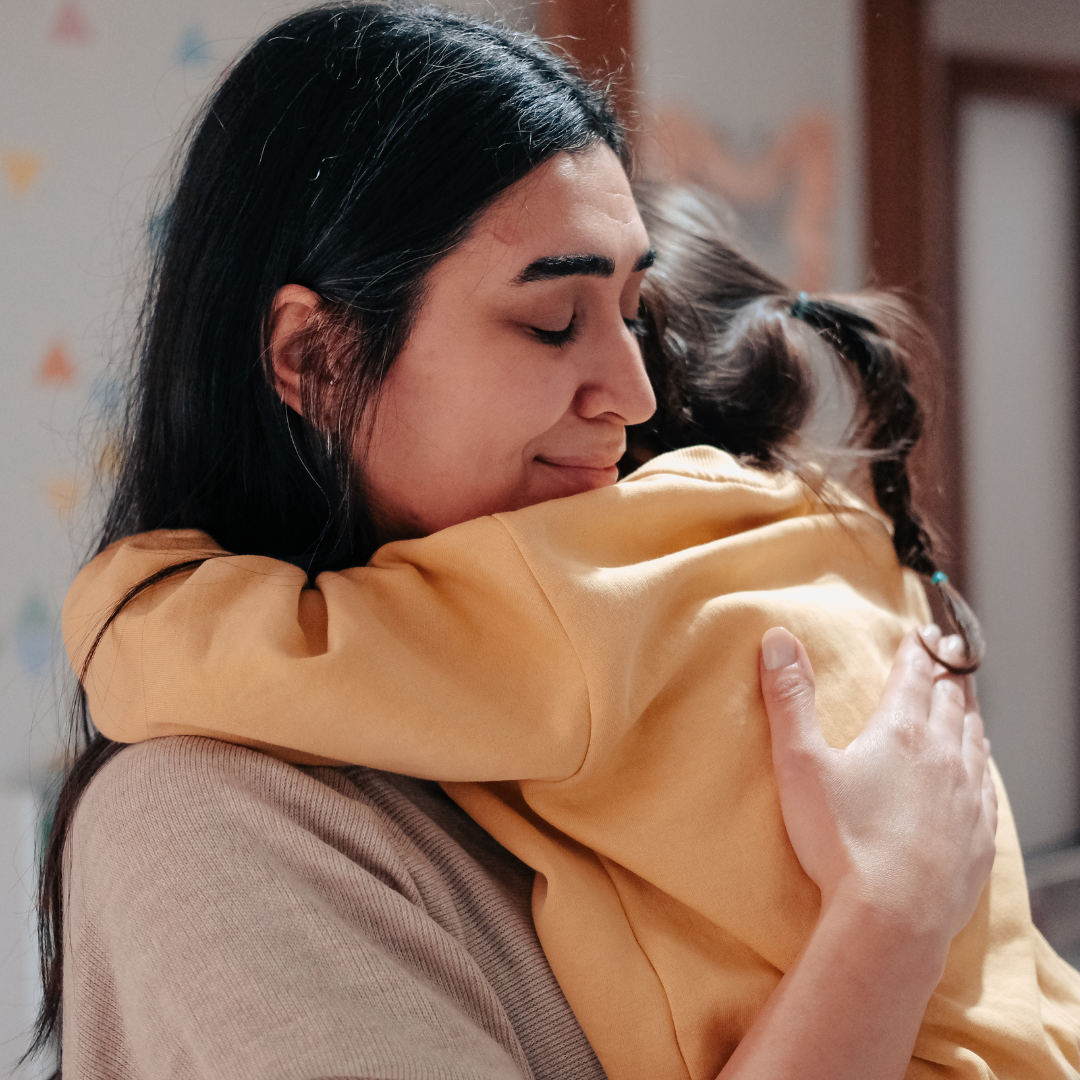


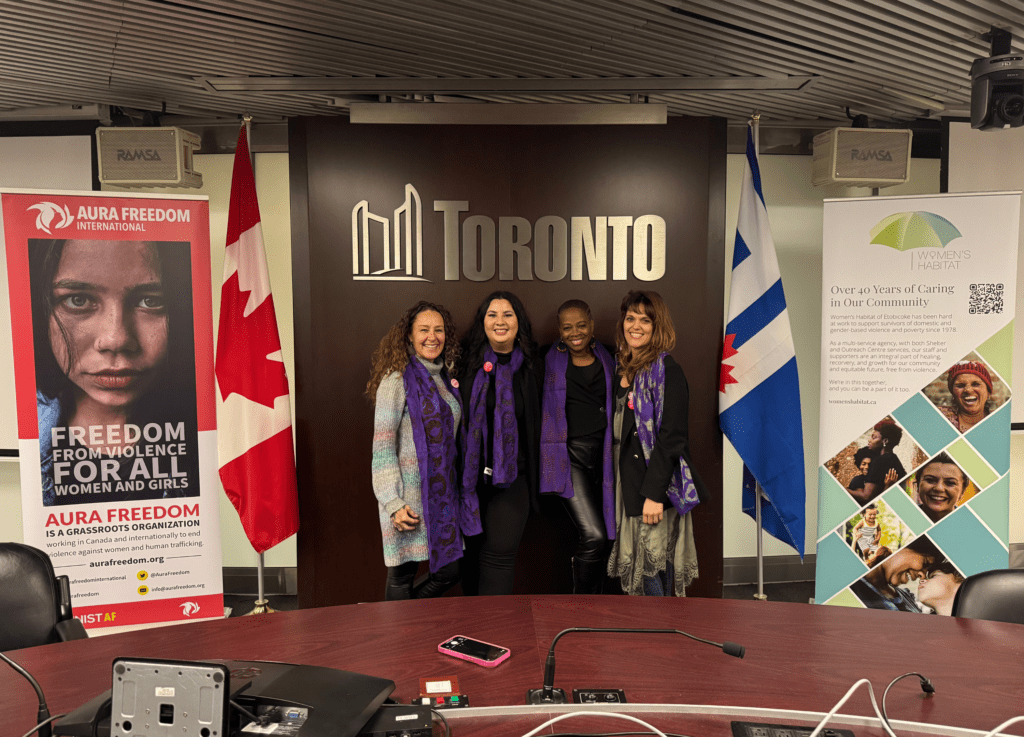
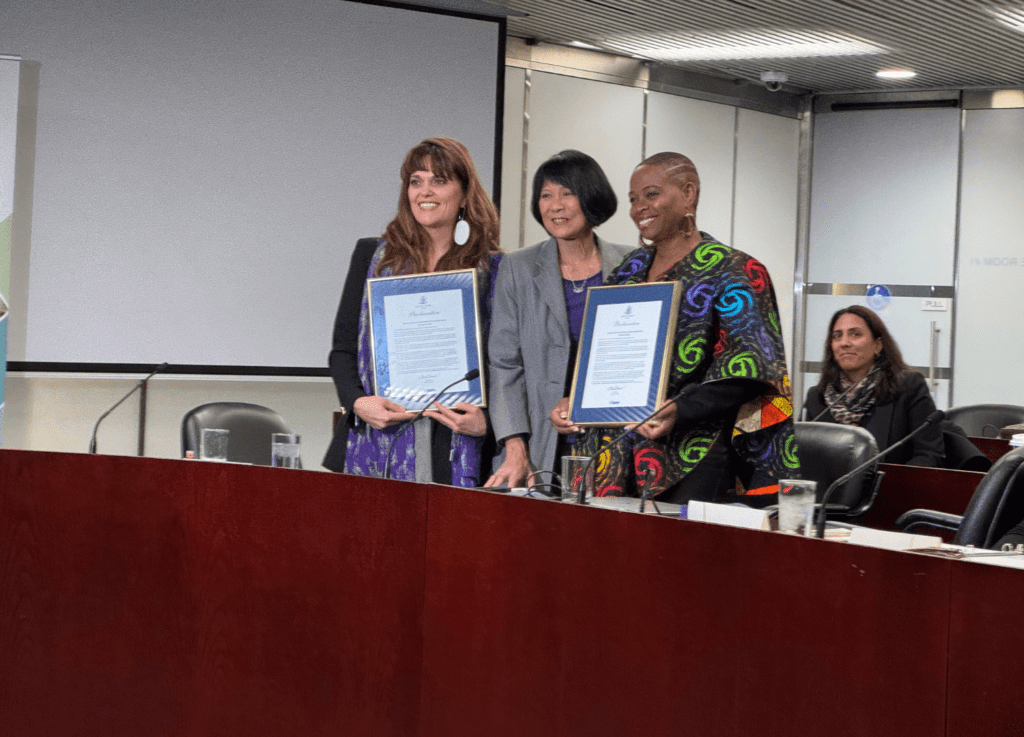
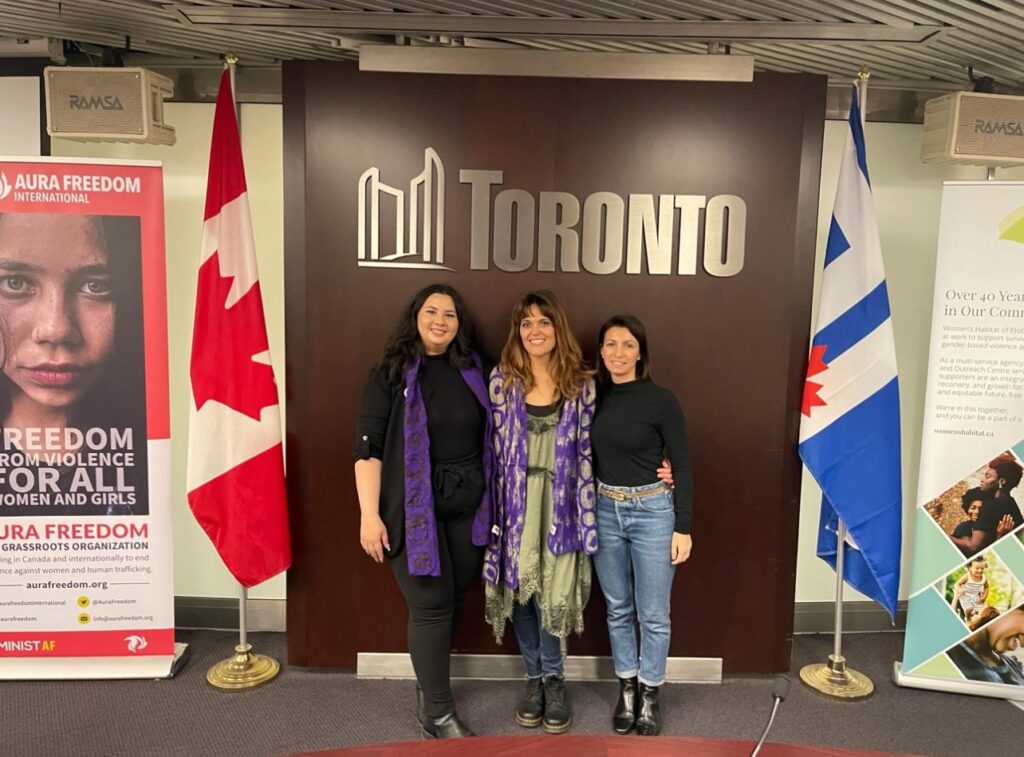
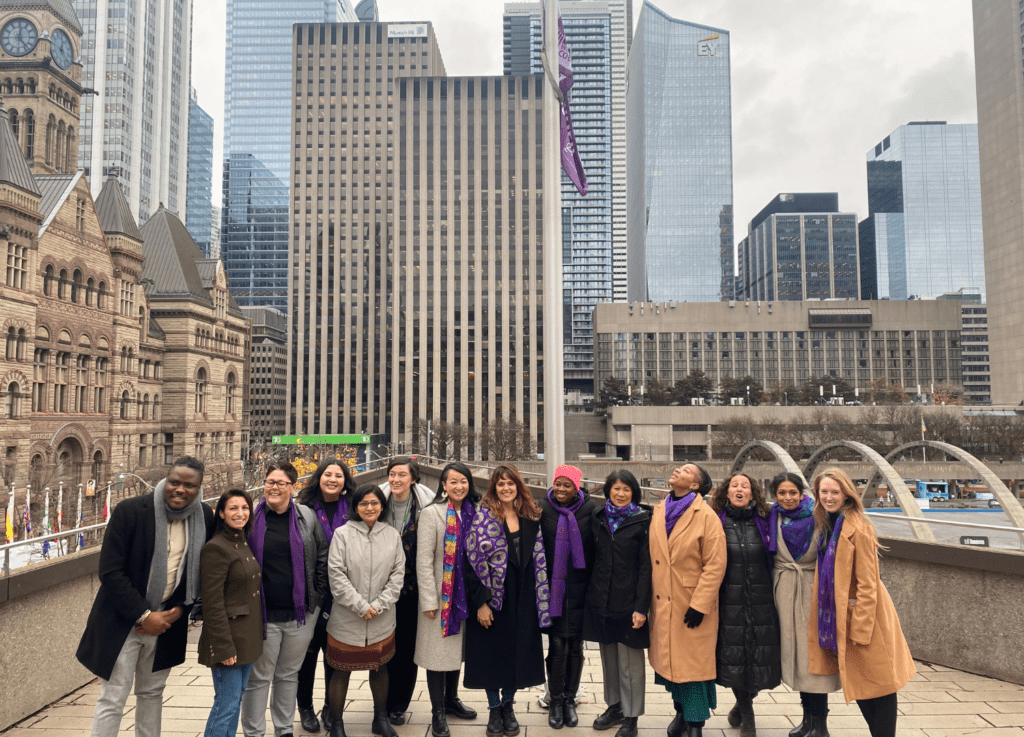
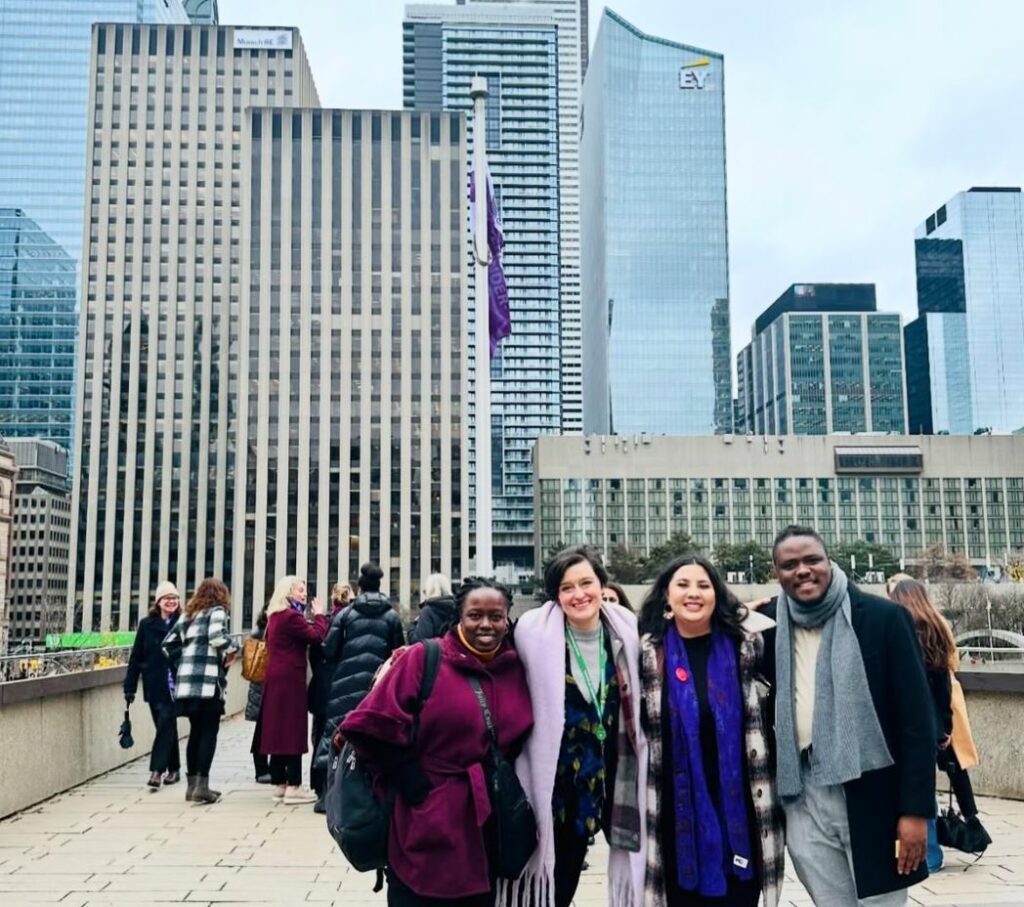
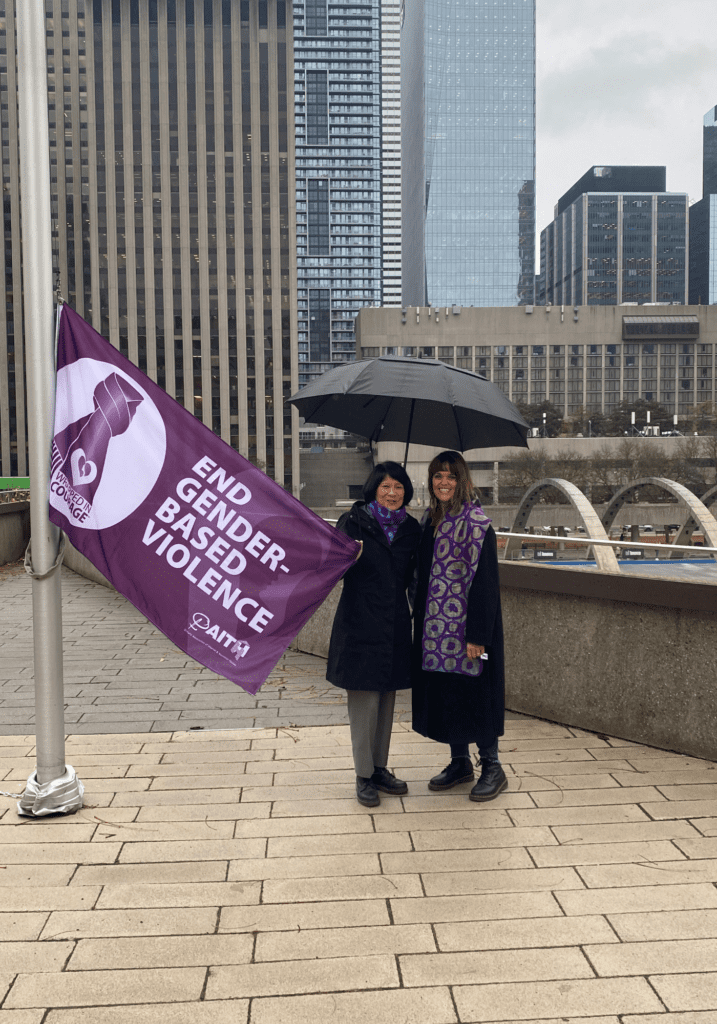
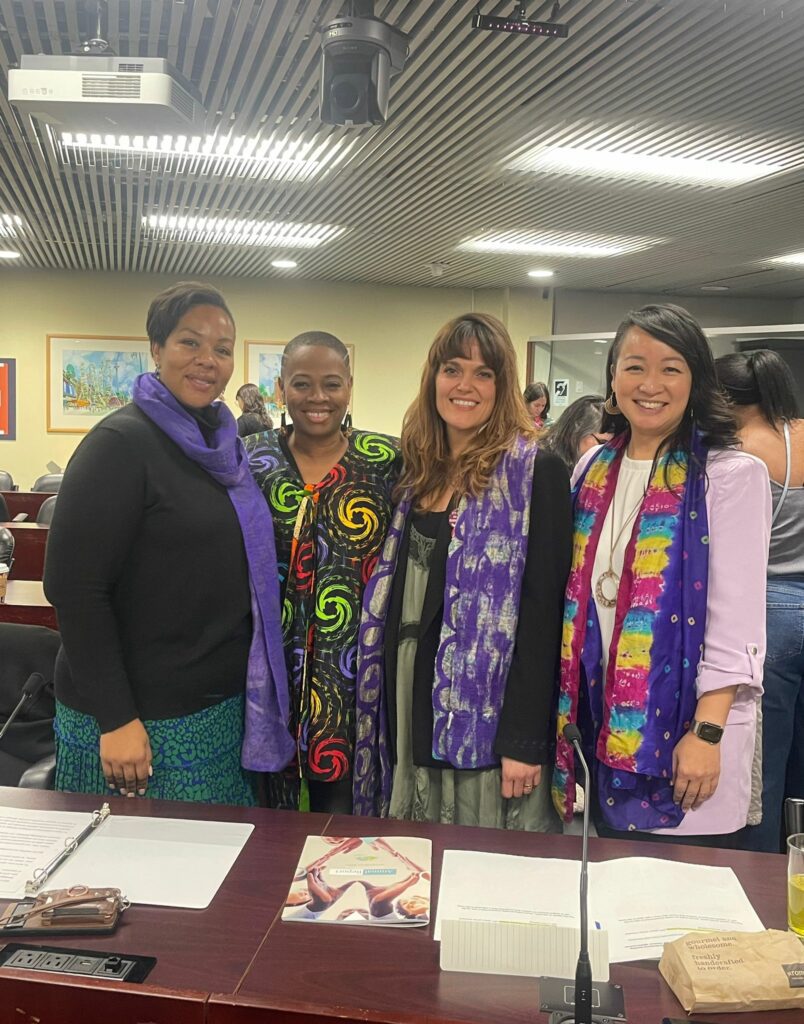
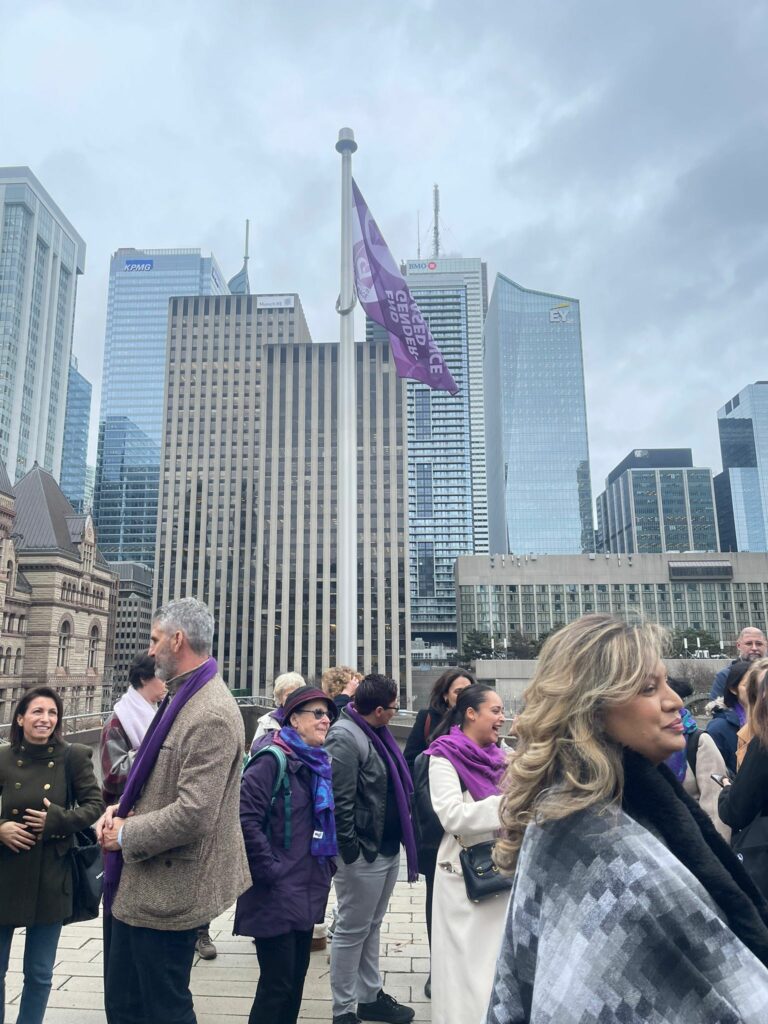
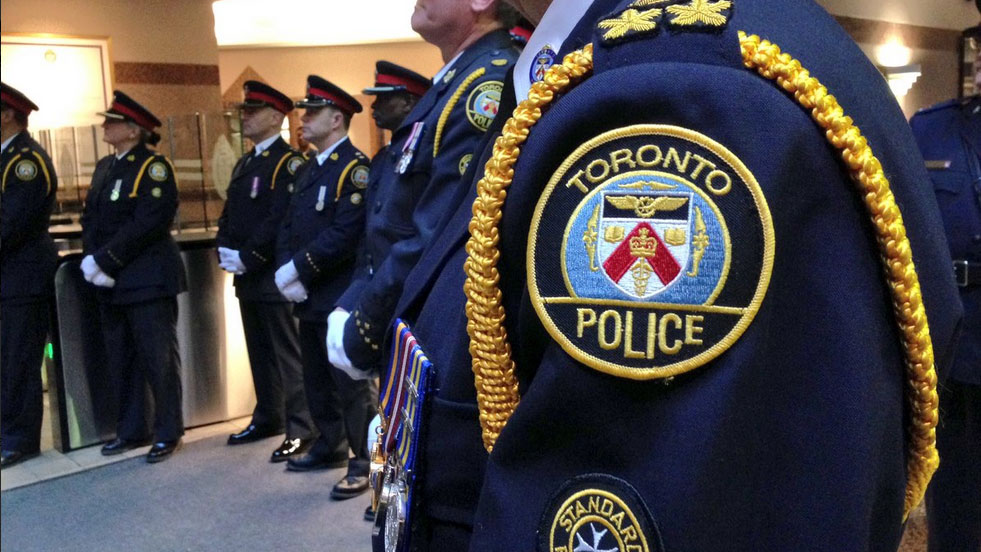

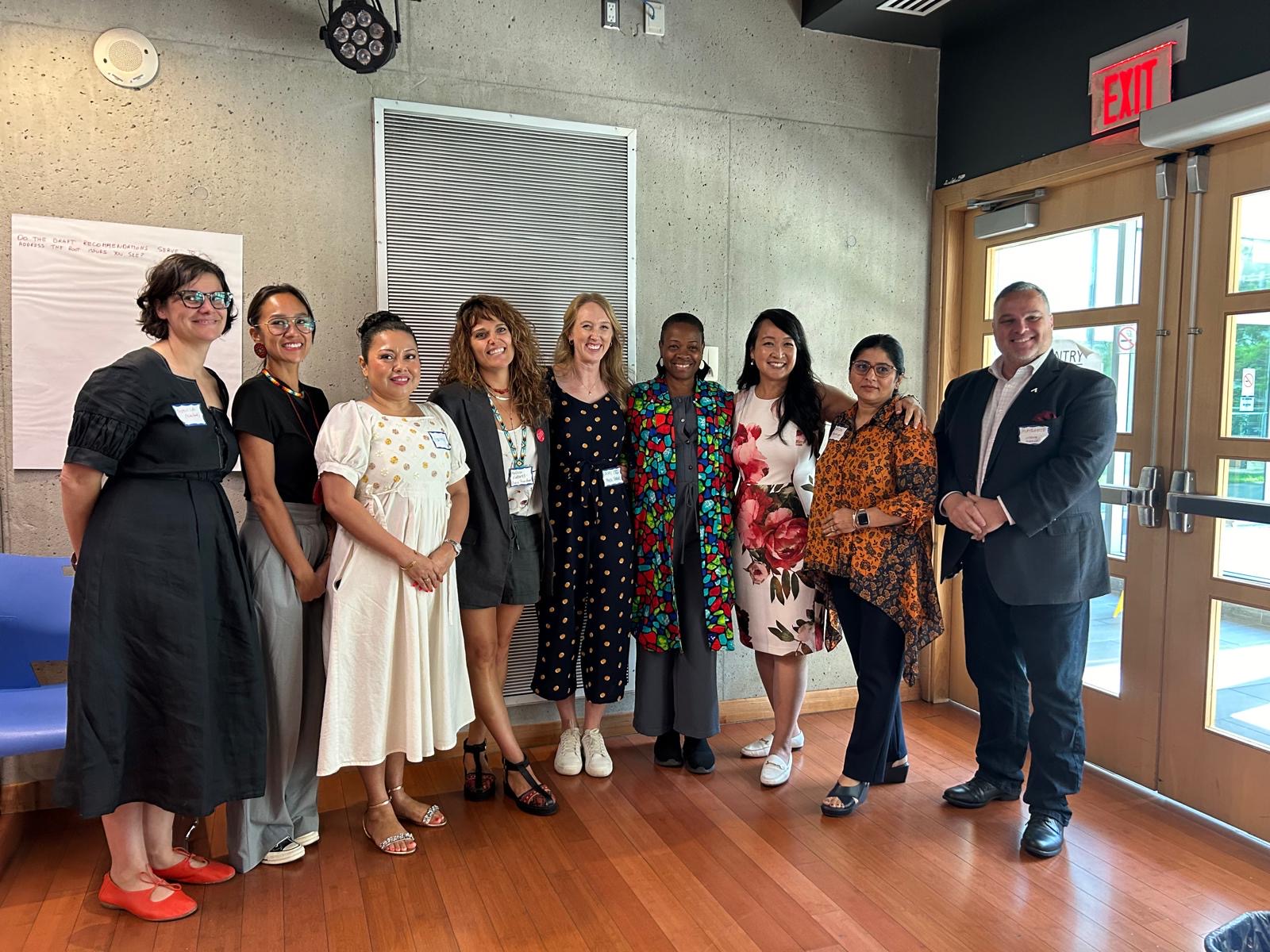



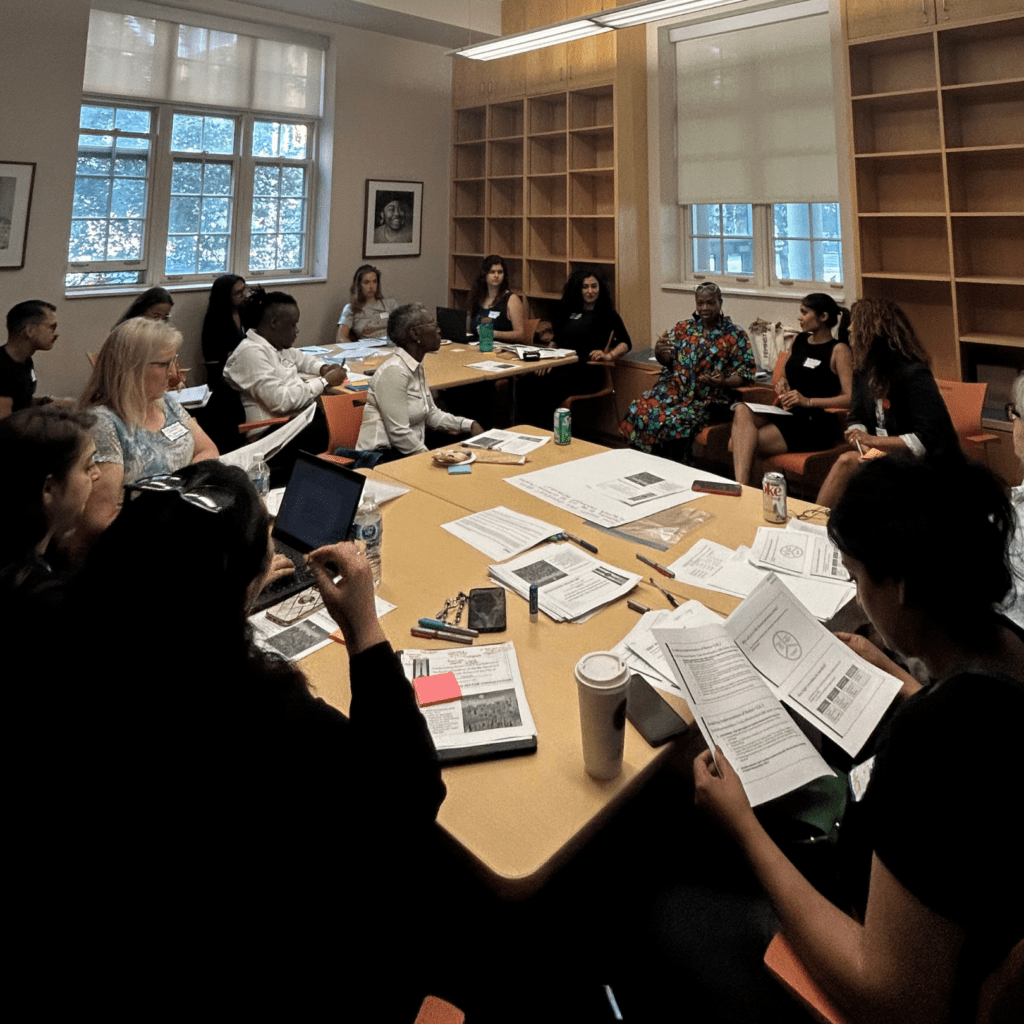

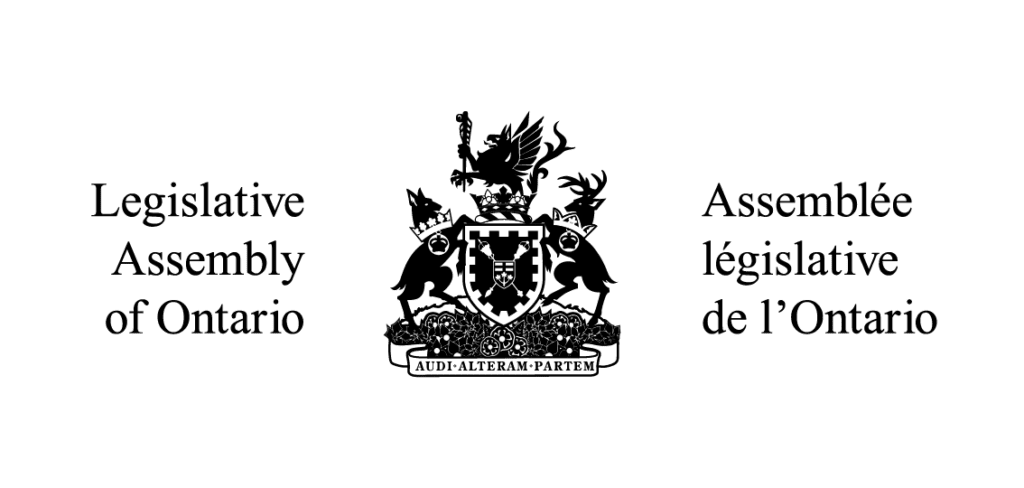



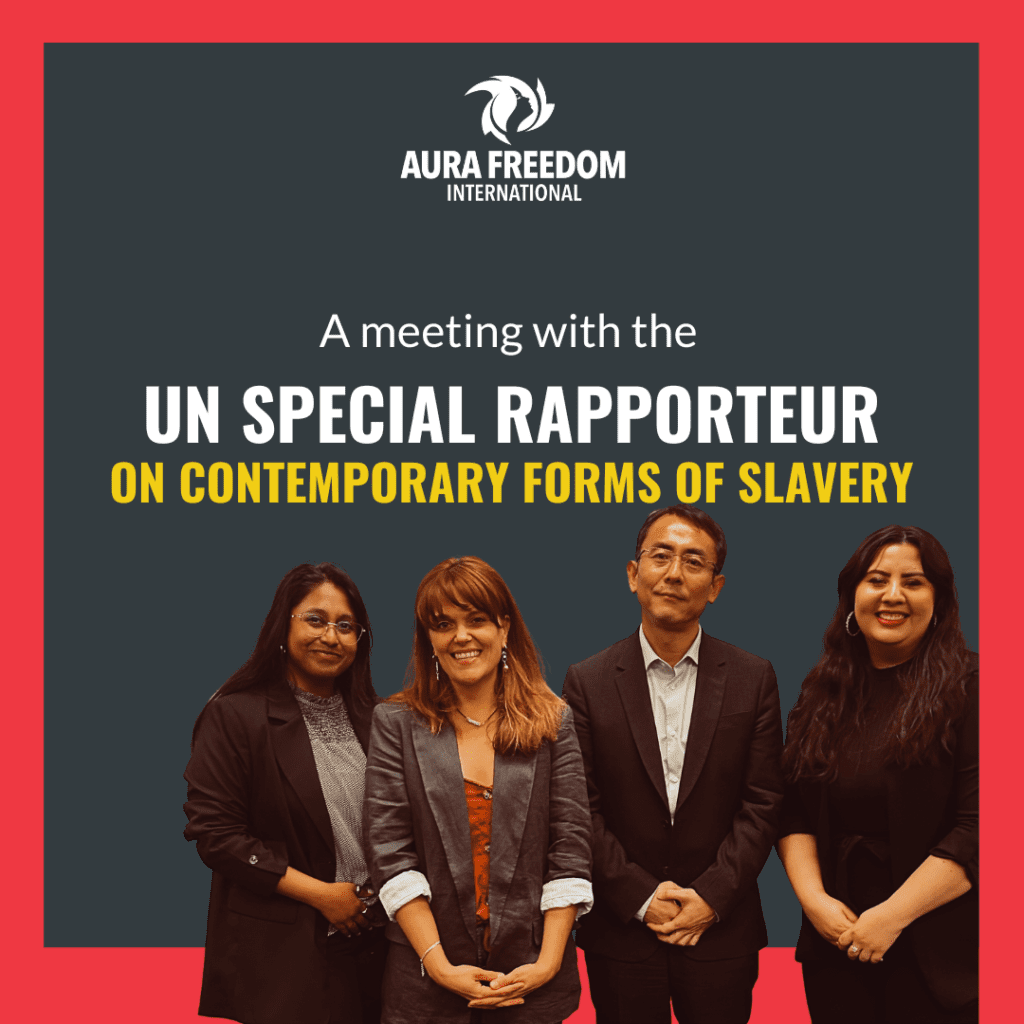

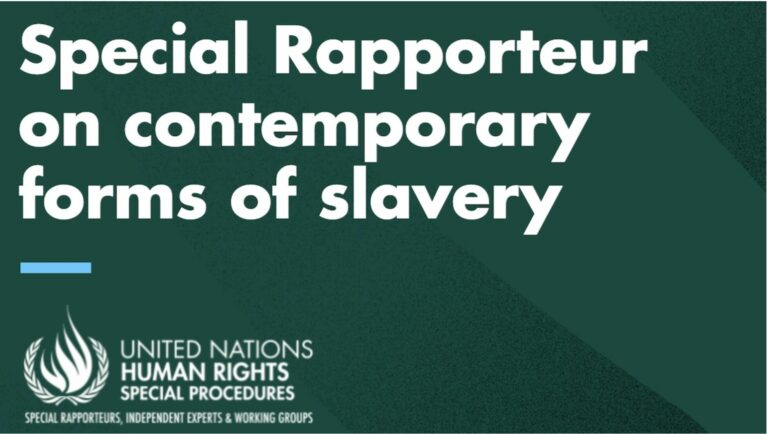

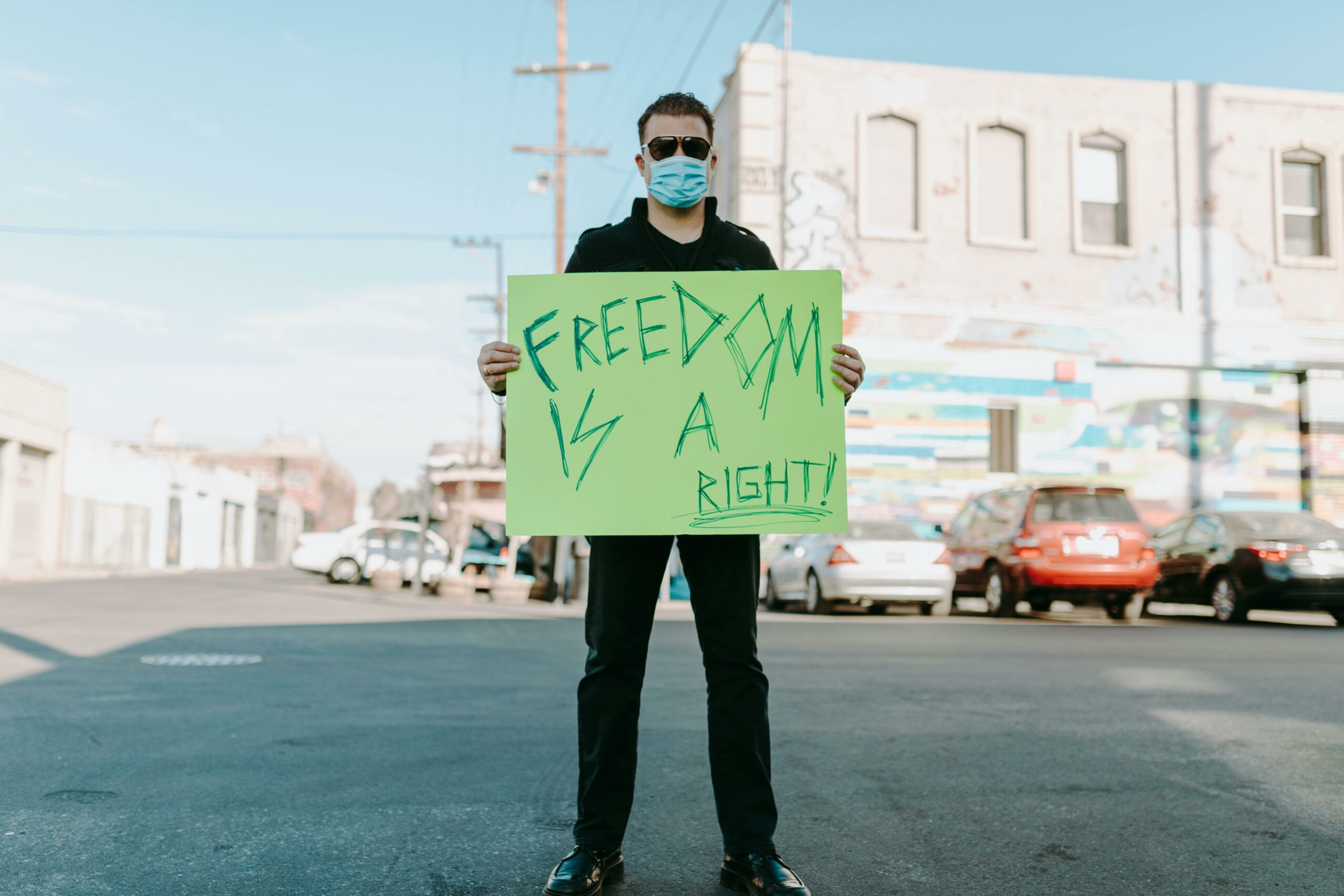

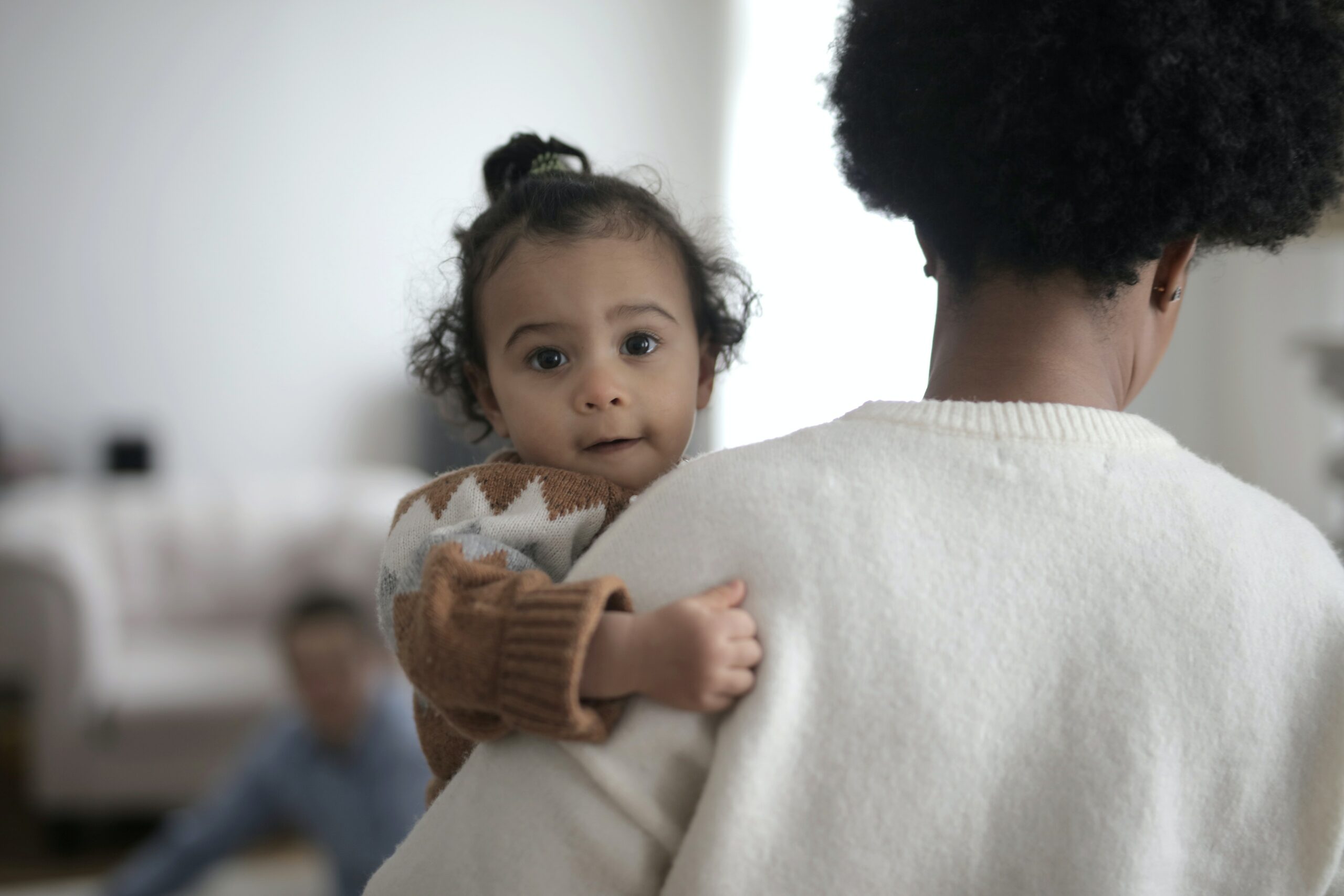
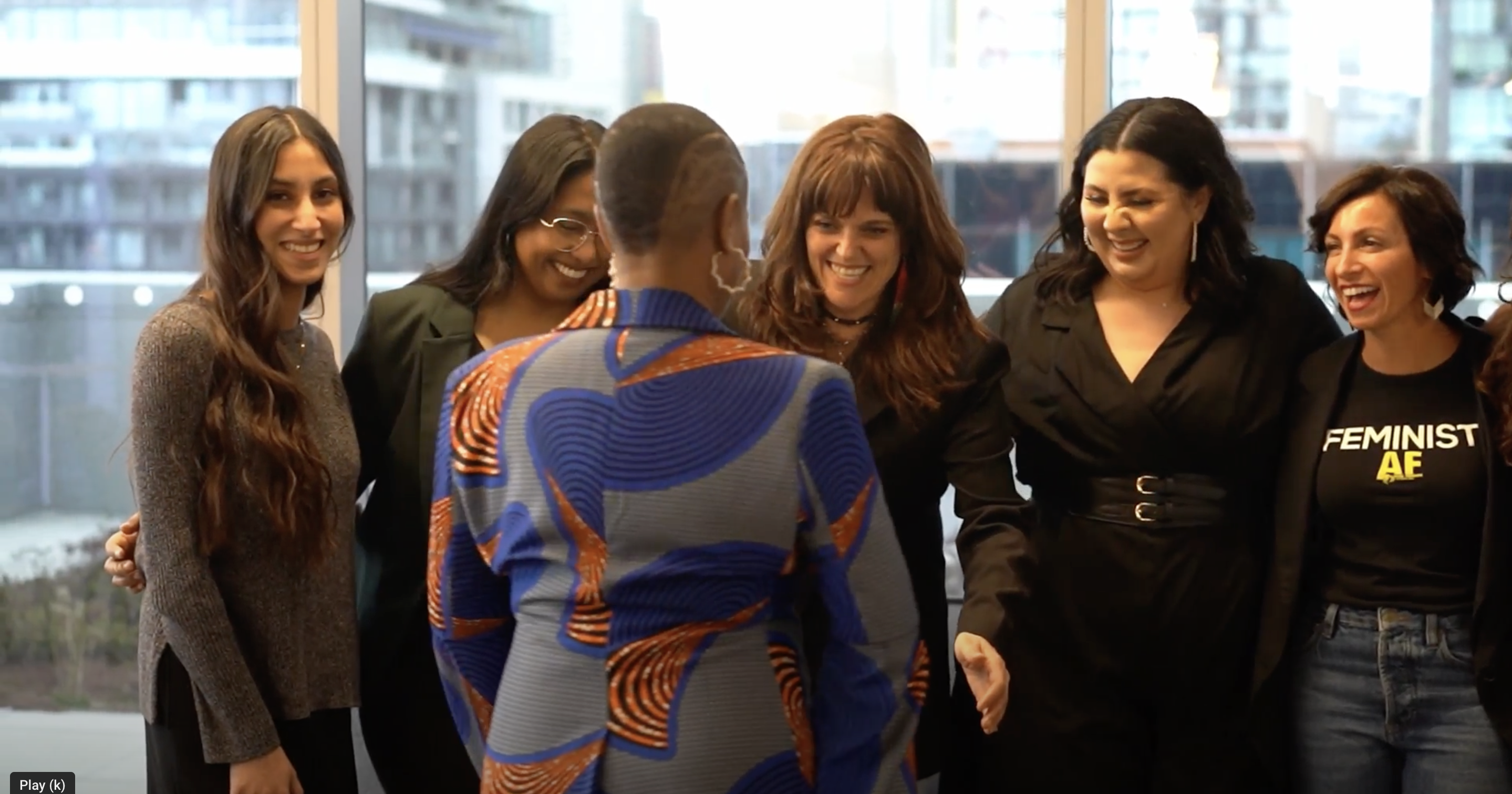
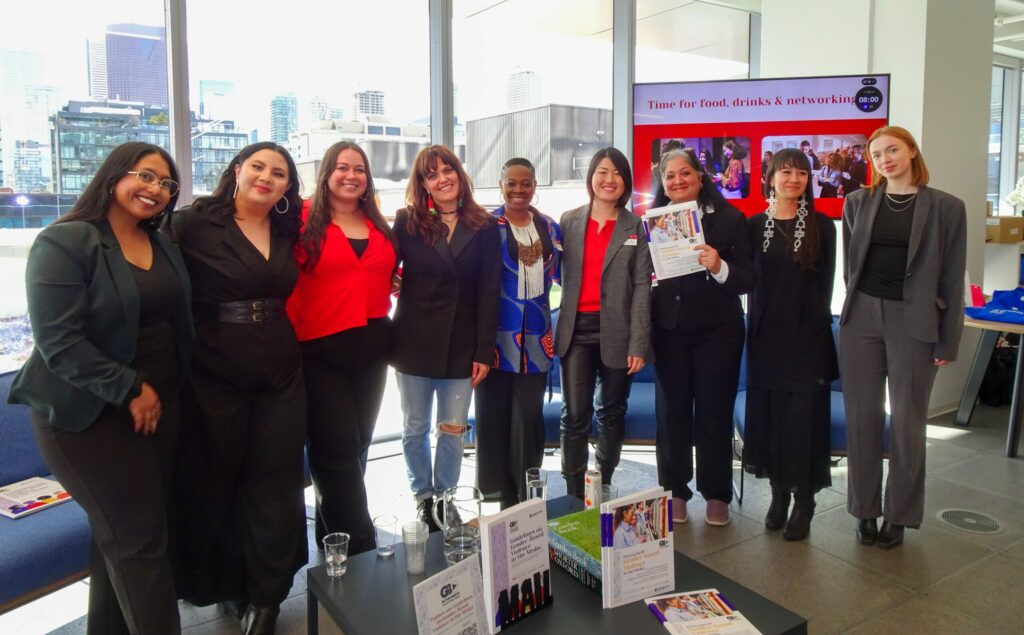

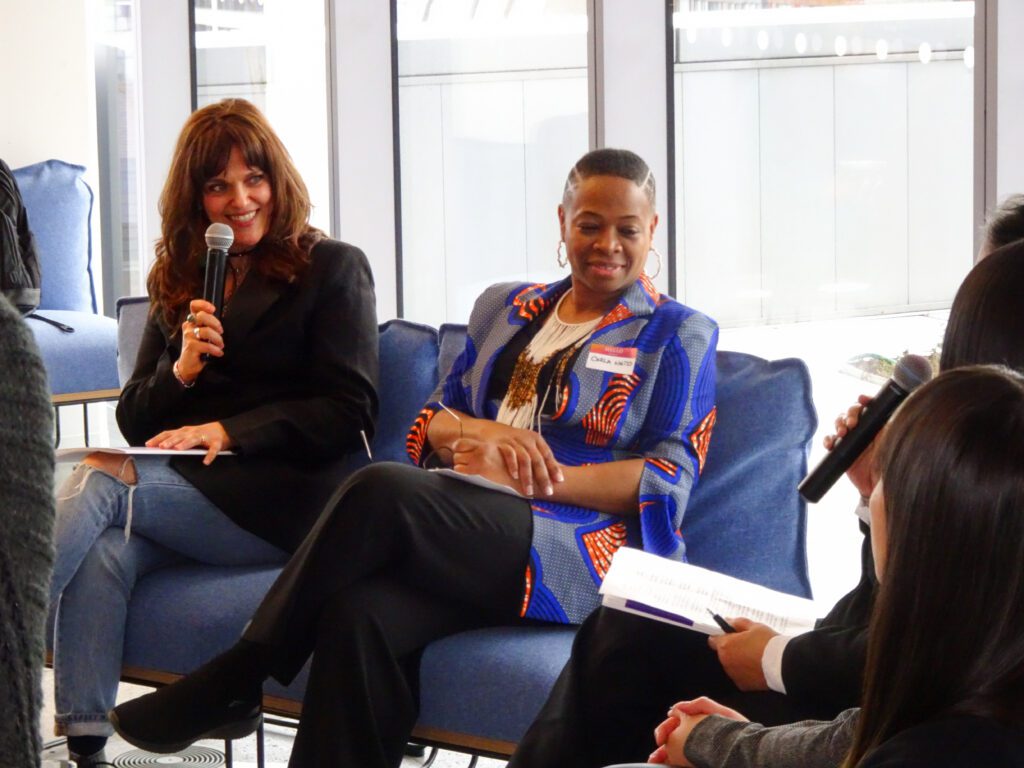
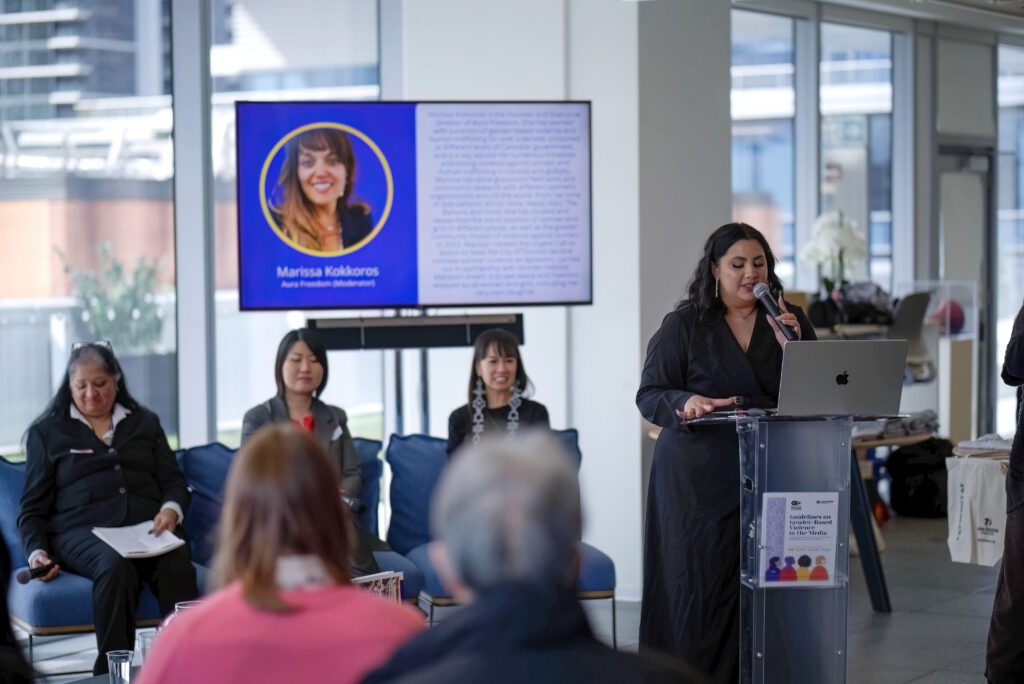
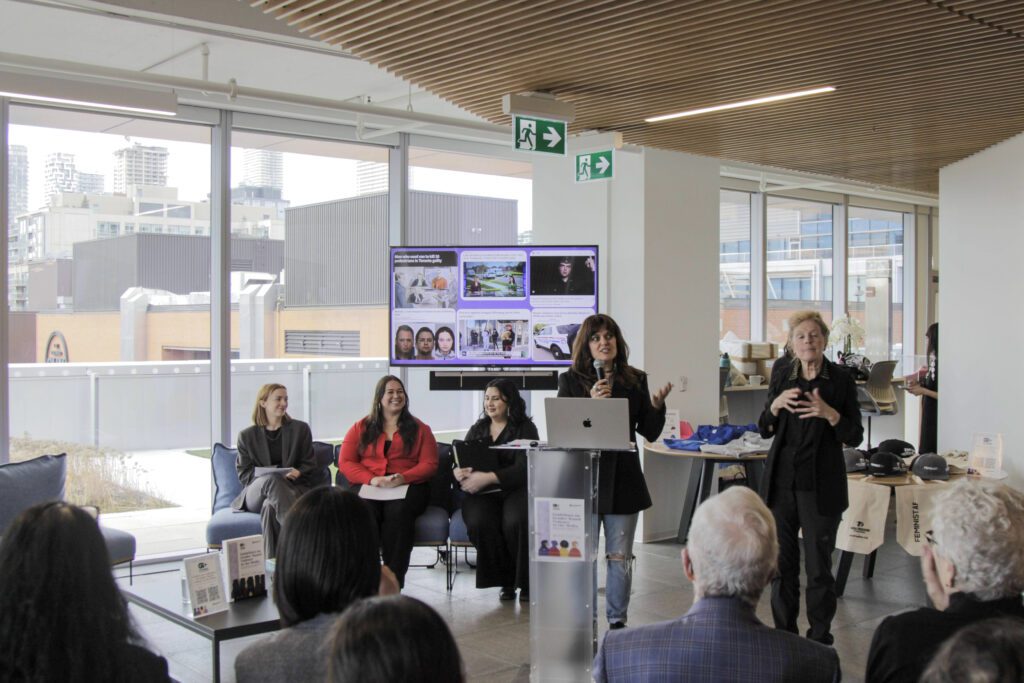
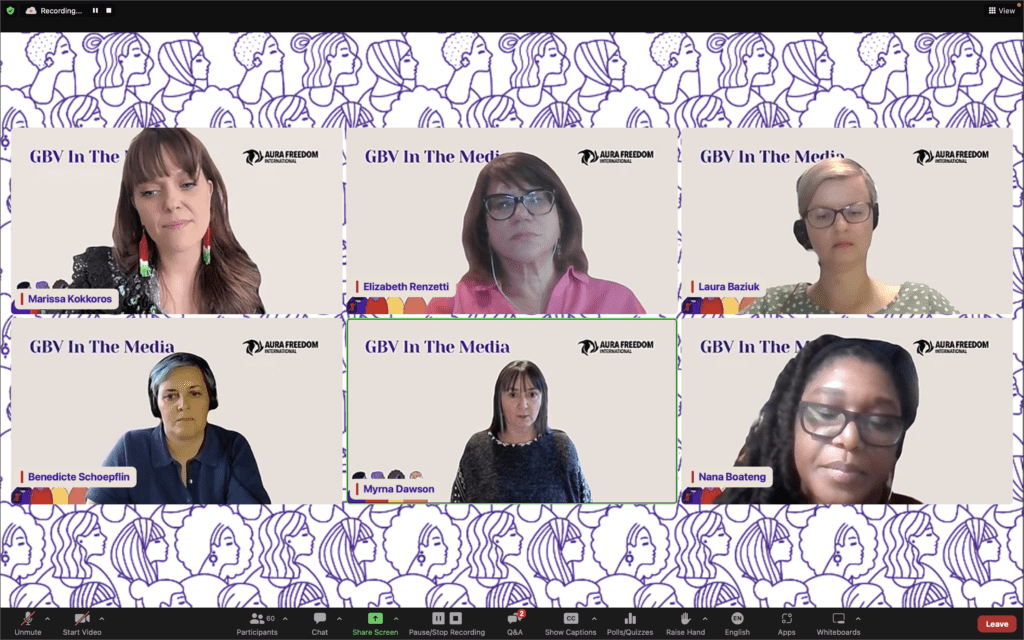
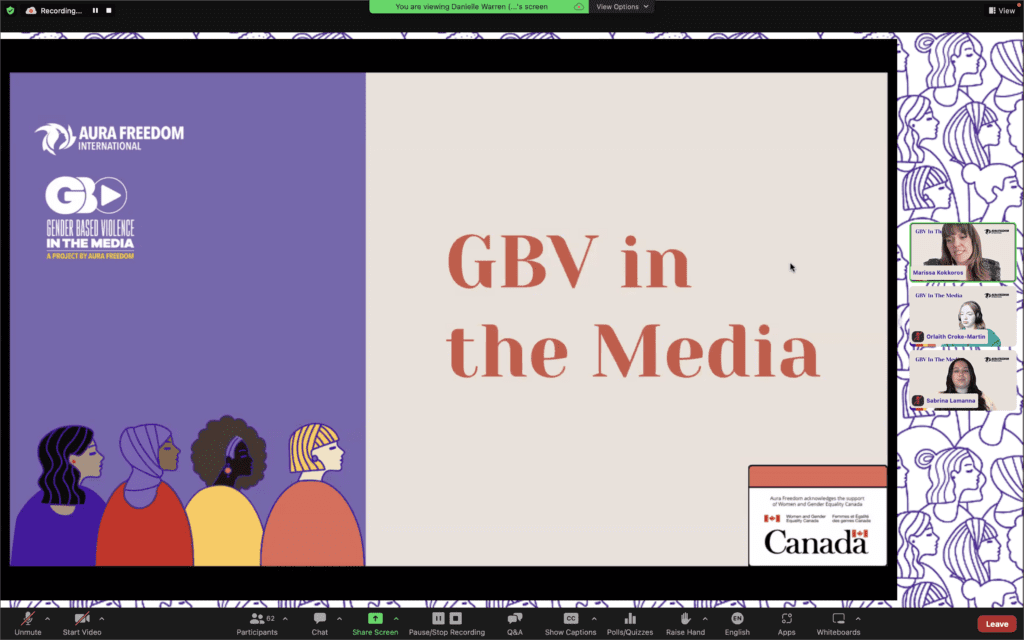

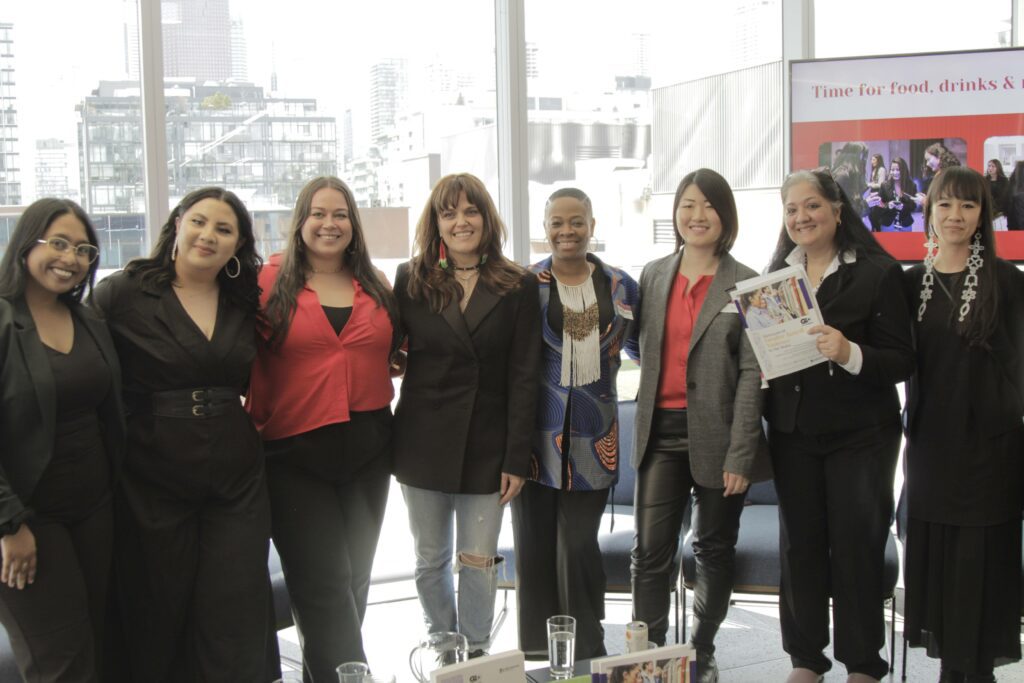
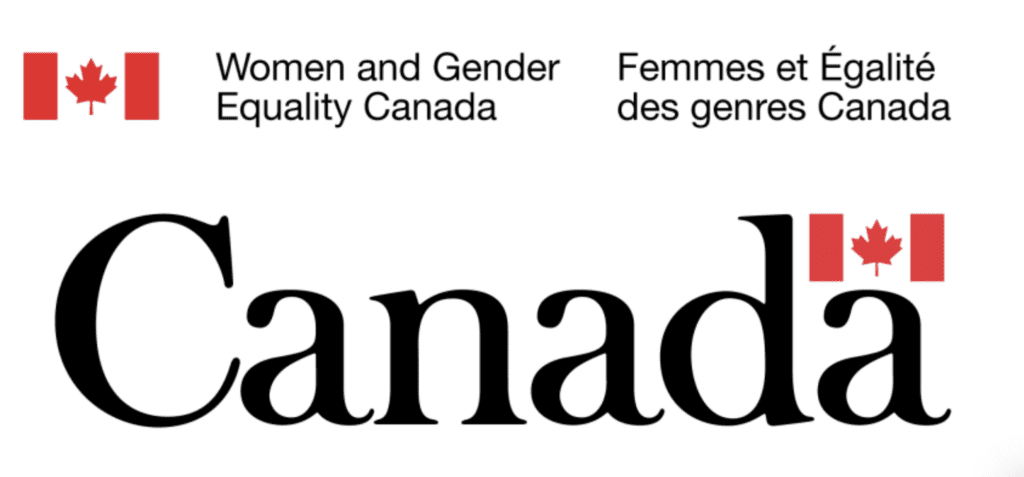
What a day!
To kick off the 16 Days of Activism to End Gender-Based Violence, Aura Freedom and Women’s Habitat of Etobicoke co-hosted this year’s Wrapped in Courage Flag Raising event at Toronto City Hall. We were honoured to join the Ontario Association of Interval and Transition Houses (OAITH)’s annual Wrapped in Courage campaign to recognize Woman Abuse Prevention month.
Together, we brought almost 100 advocates, frontline workers and survivors to Toronto City Hall to raise a flag and honour our collective work to address the epidemic of Intimate Partner Violence, breaking the silence and standing together in solidarity against the increasing rates of femicide and violence against women, girls, and gender-diverse people in our communities.
A special thank you goes to both Mayor Olivia Chow and Toronto City Councillor Lily Cheng for welcoming us to Toronto City Hall.
And thank you to our esteemed speakers for sharing their powerful words of support for eradicating gender-based violence and intimate partner violence: the Honourable Charmaine Williams, Amy Lester on behalf of MPP Marit Stiles, Mayor Chow, Councillor Cheng, and Marlene Ham of OAITH.
The flag is a symbol of commitment and of solidarity and we are grateful to all who supported this important day.